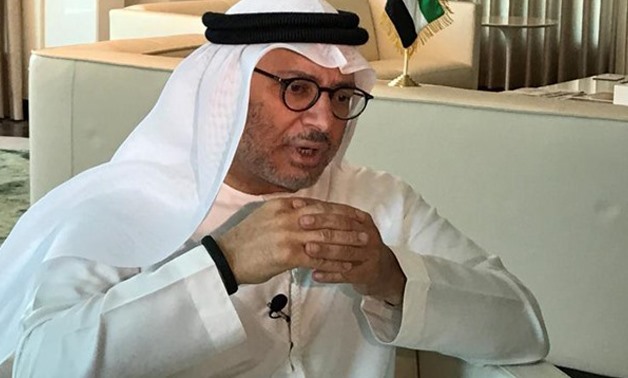
UAE Foreign Minister Anwar Gargash - Reuters
CAIRO – 19 June 2018: The Iran-Qatar convergence is growing, which goes at odds with the Qatari people’s beliefs, UAE Foreign Minister Anwar Gargash said on Monday.
Iranian President Hassan Rouhani received a phone call from Emir of Qatar Sheikh Tamim bin Hamad, greeting the latter on the occasion of Eid Al Fitr and expressing his wishes for the Iranian-Qatari trade and economic relations to strengthen, Mehr News Agency reported on Monday.
During the phone call, as Mehr stated, Rouhani hailed the Qatari government’s firm resistance in the face of the “Blockade” imposed on Doha.
”What the Iranian Mehr News Agency reported is not surprising; it is just a divulgence of what has been long-hidden," Gargash tweeted on Monday, stressing that such stances do not reflect the Qatari people, who are not satisfied with the government's new approach that supports the Houthis and normalizes relationships with Israel.
Qatari Emir Sheikh Tamim bin Hamad Al-Thani issued a decree on Tuesday appointing Mohammed Hamad Saad al-Fuhaid al-Hajri as Doha's new ambassador to Tehran.
A week ago, and according to Mehr, bin Hamad issued a decree to appoint a new Qatari ambassador to Tehran.
The new Qatari ambassador has already served in several countries, including Yemen, Libya and Greece and was nominated to fill the seat that has been vacant for 18 months.
In 2015, Qatar recalled its ambassador from Tehran in protest of the ransacking of the Saudi Embassy in Tehran following an alleged assassination of a Shia scholar by the Saudi authorities.
In previous tweets in June, Gargash said that the Anti-Terrorism Quartet will not terminate its boycott of Qatar, asserting that Doha is the one to blame for insisting on its policies.
Gargash’s remarks came in an interview with The National where he addressed the Qatari crisis on the first anniversary of imposing economic boycott on Qatar by Egypt, UAE, Saudi Arabia and Bahrain.
Led by Saudi Arabia and the UAE, the alliance of Arab Sunni states has been fighting the Iran-aligned Houthis for more than three years now.
One year ago, Egypt, Saudi Arabia, Bahrain and the United Arab Emirates have turned on Qatar with a complete air and trade boycott over allegations of its support and sponsorship of terrorism, an accusation which Doha denies.
Following the Arab boycott of Doha, a list of 13-demands was handed to Doha’s government by Egypt, Saudi Arabia, the UAE and Bahrain for reconciliation. The demands included closing Al-Jazeera broadcasting and suspending Qatar's cozy relationship with the extremist government of Iran.
Since then, Qatar has resisted conciliation attempts, and has not shown any efforts to disassociate itself from the terrorist groups which were proven to be harbored and financially supported by Doha.
However, Qatar placed several people and entities on its terrorism list in March, including several Qatari nationals already blacklisted by the Arab Quartet that accused Doha of supporting militants. Qatar’s issuance of a terror list of 19 individuals and eight entities has done little to cater to decision-makers in the four Arab countries.

Comments
Leave a Comment